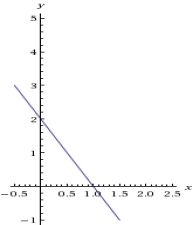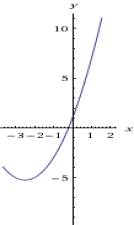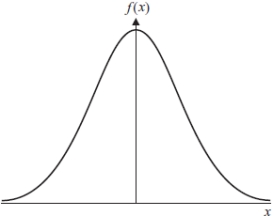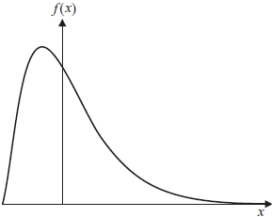Deck 3: A Brief Overview of the Classical Linear Regression Model
Question
Question
Question
Question
Question
Question
Question
Question
Question
Question
Question
Question
Question
Question
Question
Question
Question
Question
Question
Question
Question
Question
Question
Question
Question
Question
Question
Question

Unlock Deck
Sign up to unlock the cards in this deck!
Unlock Deck
Unlock Deck
1/28
Play
Full screen (f)
Deck 3: A Brief Overview of the Classical Linear Regression Model
1
Consider the following graphs.
A. B.
B.
Which of the following statements is true?
A) A is depicts a non-linear relationship between y and x
B) B is depicts a linear relationship between y and x
C) A and B depict linear and non-linear relationships between y and x respectively
D) A and B depict non-linear and linear relationships between y and x respectively
A.
 B.
B.
Which of the following statements is true?
A) A is depicts a non-linear relationship between y and x
B) B is depicts a linear relationship between y and x
C) A and B depict linear and non-linear relationships between y and x respectively
D) A and B depict non-linear and linear relationships between y and x respectively
A and B depict linear and non-linear relationships between y and x respectively
2
The derivative of e4x-2 is:
A) 4/(4x-2)
B) (4x-2)e4
C) (4x-2)e4x-2
D) 4e4x-2
A) 4/(4x-2)
B) (4x-2)e4
C) (4x-2)e4x-2
D) 4e4x-2
4e4x-2
3
Log(1) is:
A) 1
B) 0
C) 2.71828…
D) Undefined
A) 1
B) 0
C) 2.71828…
D) Undefined
0
4
What is the second order derivative of the function ? 
A)
B)
C)
D)

A)

B)

C)

D)


Unlock Deck
Unlock for access to all 28 flashcards in this deck.
Unlock Deck
k this deck
5
The linear relationship between two variables (y and x) can be represented by the equation. Which of the following statements is true?  (I) Parameter a is termed the intercept
(I) Parameter a is termed the intercept
(II) Parameter a is termed the slope
(III) Parameter b is termed the gradient
(IV) Parameter b is termed the constant
A) I and IV only
B) I and III only
C) II and III only
D) II and IV only
 (I) Parameter a is termed the intercept
(I) Parameter a is termed the intercept(II) Parameter a is termed the slope
(III) Parameter b is termed the gradient
(IV) Parameter b is termed the constant
A) I and IV only
B) I and III only
C) II and III only
D) II and IV only

Unlock Deck
Unlock for access to all 28 flashcards in this deck.
Unlock Deck
k this deck
6
If A is of dimension 1 * 4 and B is of dimension 4 * 1, what is the most accurate term to describe the result of the matrix multiplication AB?
A) A scalar
B) A column vector
C) A row vector
D) A matrix
A) A scalar
B) A column vector
C) A row vector
D) A matrix

Unlock Deck
Unlock for access to all 28 flashcards in this deck.
Unlock Deck
k this deck
7
The derivative of log(5x) is:
A) 5/x
B) 1/x
C) 5log(x)
D) 5/log(x)
A) 5/x
B) 1/x
C) 5log(x)
D) 5/log(x)

Unlock Deck
Unlock for access to all 28 flashcards in this deck.
Unlock Deck
k this deck
8
Assume that the relationship between a company's stock price (y) and dividends paid per share (x) is linear. If the slope of the equation is 0.50 and the intercept is 30, what would be the expected stock price if the dividend paid was 3?
A) 33
B) 30.50
C) 31.5
D) 30
A) 33
B) 30.50
C) 31.5
D) 30

Unlock Deck
Unlock for access to all 28 flashcards in this deck.
Unlock Deck
k this deck
9
If matrices and, what is AB? 

A)
B)
C)
D)


A)

B)

C)

D)


Unlock Deck
Unlock for access to all 28 flashcards in this deck.
Unlock Deck
k this deck
10
The simplest possible way of writing 3x5 * 7x3 is:
A) 21 x5 * x3
B) 21 x15
C) 21x8
D) 21x53
A) 21 x5 * x3
B) 21 x15
C) 21x8
D) 21x53

Unlock Deck
Unlock for access to all 28 flashcards in this deck.
Unlock Deck
k this deck
11
Which of the following values are closes to the roots of the following quadratic equation: ? 
A) 0 and 4
B) 1 and 4
C) 0.5 and 3
D) 0.3 and 3.7

A) 0 and 4
B) 1 and 4
C) 0.5 and 3
D) 0.3 and 3.7

Unlock Deck
Unlock for access to all 28 flashcards in this deck.
Unlock Deck
k this deck
12
is equal to: 
A) 5y
B) y
C) y5
D) 5y5

A) 5y
B) y
C) y5
D) 5y5

Unlock Deck
Unlock for access to all 28 flashcards in this deck.
Unlock Deck
k this deck
13
Another way of writing elog(x) is:
A) 1
B) log(x)
C) ex
D) x
A) 1
B) log(x)
C) ex
D) x

Unlock Deck
Unlock for access to all 28 flashcards in this deck.
Unlock Deck
k this deck
14
What are the roots of the equation y = 2x2 + 2x - 4?
A) -2 and 1
B) -1 and 2
C) -2 and 2
D) -2 (repeated)
A) -2 and 1
B) -1 and 2
C) -2 and 2
D) -2 (repeated)

Unlock Deck
Unlock for access to all 28 flashcards in this deck.
Unlock Deck
k this deck
15
A) B)
B)
Which of the following statements is true about graph (A) above?
A) The intercept of the graph is positive and its slope is negative
B) The intercept of the graph is negative and its slope is positive
C) Both the intercept and slope of the graph are positive
D) It is impossible to say anything about the intercept and slope without seeing the mathematical equation
 B)
B)
Which of the following statements is true about graph (A) above?
A) The intercept of the graph is positive and its slope is negative
B) The intercept of the graph is negative and its slope is positive
C) Both the intercept and slope of the graph are positive
D) It is impossible to say anything about the intercept and slope without seeing the mathematical equation

Unlock Deck
Unlock for access to all 28 flashcards in this deck.
Unlock Deck
k this deck
16
"x to the power 3" could be written:
A) 3x
B) 3x3
C) x3
D) 3x * 3x * 3x
A) 3x
B) 3x3
C) x3
D) 3x * 3x * 3x

Unlock Deck
Unlock for access to all 28 flashcards in this deck.
Unlock Deck
k this deck
17
What are the roots of the equation y = x2 + 2x - 6 closest to?
A) -4 and 2
B) -3.65 and 1.65
C) -7.3 and 3.3
D) Both complex
A) -4 and 2
B) -3.65 and 1.65
C) -7.3 and 3.3
D) Both complex

Unlock Deck
Unlock for access to all 28 flashcards in this deck.
Unlock Deck
k this deck
18
The rank of matrices A and B from the previous question are:
A) 1 and 2, respectively
B) 2 and 1, respectively
C) 1 and 3, respectively
D) 3 and 1, respectively
A) 1 and 2, respectively
B) 2 and 1, respectively
C) 1 and 3, respectively
D) 3 and 1, respectively

Unlock Deck
Unlock for access to all 28 flashcards in this deck.
Unlock Deck
k this deck
19
Writing out all the terms in the expression would lead to: 
A) x11 + x12 + x21 + x22
B) x11 + x12 +x21 + x22
C) x1 + x2
D) x11 + x22

A) x11 + x12 + x21 + x22
B) x11 + x12 +x21 + x22
C) x1 + x2
D) x11 + x22

Unlock Deck
Unlock for access to all 28 flashcards in this deck.
Unlock Deck
k this deck
20
What is the (first order) derivative of the function ? 
A)
B)
C)
D)

A)

B)

C)

D)


Unlock Deck
Unlock for access to all 28 flashcards in this deck.
Unlock Deck
k this deck
21
For two conformable matrices A and B, expanding the parentheses of (AB)-1 gives:
A) A-1B-1
B) B-1A-1
C) BA
D) AB
A) A-1B-1
B) B-1A-1
C) BA
D) AB

Unlock Deck
Unlock for access to all 28 flashcards in this deck.
Unlock Deck
k this deck
22
The point where the capital market line is tangential to the efficient frontier is
A) The point where the portfolio returns are minimised
B) The point where the portfolio returns are maximised
C) The point where the portfolio's Sharpe ratio is minimised
D) The point where the portfolio's Sharpe ratio is maximised
A) The point where the portfolio returns are minimised
B) The point where the portfolio returns are maximised
C) The point where the portfolio's Sharpe ratio is minimised
D) The point where the portfolio's Sharpe ratio is maximised

Unlock Deck
Unlock for access to all 28 flashcards in this deck.
Unlock Deck
k this deck
23
What is the inverse of matrix ? 
A)
B)
C)
D)

A)

B)

C)

D)


Unlock Deck
Unlock for access to all 28 flashcards in this deck.
Unlock Deck
k this deck
24
Consider the following two graphs:
A. B.
B. Which of the following statements is true if A represents a normal distribution?
Which of the following statements is true if A represents a normal distribution?
(I) The skewness of the distribution plot A is 0 and its kurtosis is 3
(II) The skewness of the distribution plot B is 0 and its kurtosis is 3
(III) The excess kurtosis of the distribution plot A is 3
(IV) The excess kurtosis of the distribution plot B is 0
A) Both (I) and (III) are true
B) Only (III) is true
C) Only (I) is true
D) Both (I) and (IV) are true
A.
 B.
B. Which of the following statements is true if A represents a normal distribution?
Which of the following statements is true if A represents a normal distribution?(I) The skewness of the distribution plot A is 0 and its kurtosis is 3
(II) The skewness of the distribution plot B is 0 and its kurtosis is 3
(III) The excess kurtosis of the distribution plot A is 3
(IV) The excess kurtosis of the distribution plot B is 0
A) Both (I) and (III) are true
B) Only (III) is true
C) Only (I) is true
D) Both (I) and (IV) are true

Unlock Deck
Unlock for access to all 28 flashcards in this deck.
Unlock Deck
k this deck
25
The rank of a square matrix is also:
A) The product of the eigenvalues
B) The sum of the eigenvalues
C) The number of non-zero eigenvalues
D) The number of correlated rows or columns
A) The product of the eigenvalues
B) The sum of the eigenvalues
C) The number of non-zero eigenvalues
D) The number of correlated rows or columns

Unlock Deck
Unlock for access to all 28 flashcards in this deck.
Unlock Deck
k this deck
26
Consider the following data series: 11, 10, 6, 8, 4, 3, 7. What is its semi-interquartile range of this series?
A) 6
B) 5
C) 4
D) 3
A) 6
B) 5
C) 4
D) 3

Unlock Deck
Unlock for access to all 28 flashcards in this deck.
Unlock Deck
k this deck
27
The central limit theorem states that
A) The sampling distribution of the mean of any random sample of observations will tend towards the normal distribution with mean equal to the population mean as the sample size tends to infinity
B) The sampling distribution of the mean of any random sample of observations will tend towards the normal distribution with mean equal to the population mean as the sample size tends to zero
C) The cumulative distribution function of the mean of any random sample of observations will tend towards the normal distribution with mean equal to the population mean as the sample size tends to infinity
D) The probability distribution function of the mean of any random sample of observations will tend towards the normal distribution with mean equal to the population mean as the sample size tends to infinity
A) The sampling distribution of the mean of any random sample of observations will tend towards the normal distribution with mean equal to the population mean as the sample size tends to infinity
B) The sampling distribution of the mean of any random sample of observations will tend towards the normal distribution with mean equal to the population mean as the sample size tends to zero
C) The cumulative distribution function of the mean of any random sample of observations will tend towards the normal distribution with mean equal to the population mean as the sample size tends to infinity
D) The probability distribution function of the mean of any random sample of observations will tend towards the normal distribution with mean equal to the population mean as the sample size tends to infinity

Unlock Deck
Unlock for access to all 28 flashcards in this deck.
Unlock Deck
k this deck
28
The trace of matrix C is
A) 9
B) 8
C) 7
D) 6
A) 9
B) 8
C) 7
D) 6

Unlock Deck
Unlock for access to all 28 flashcards in this deck.
Unlock Deck
k this deck



